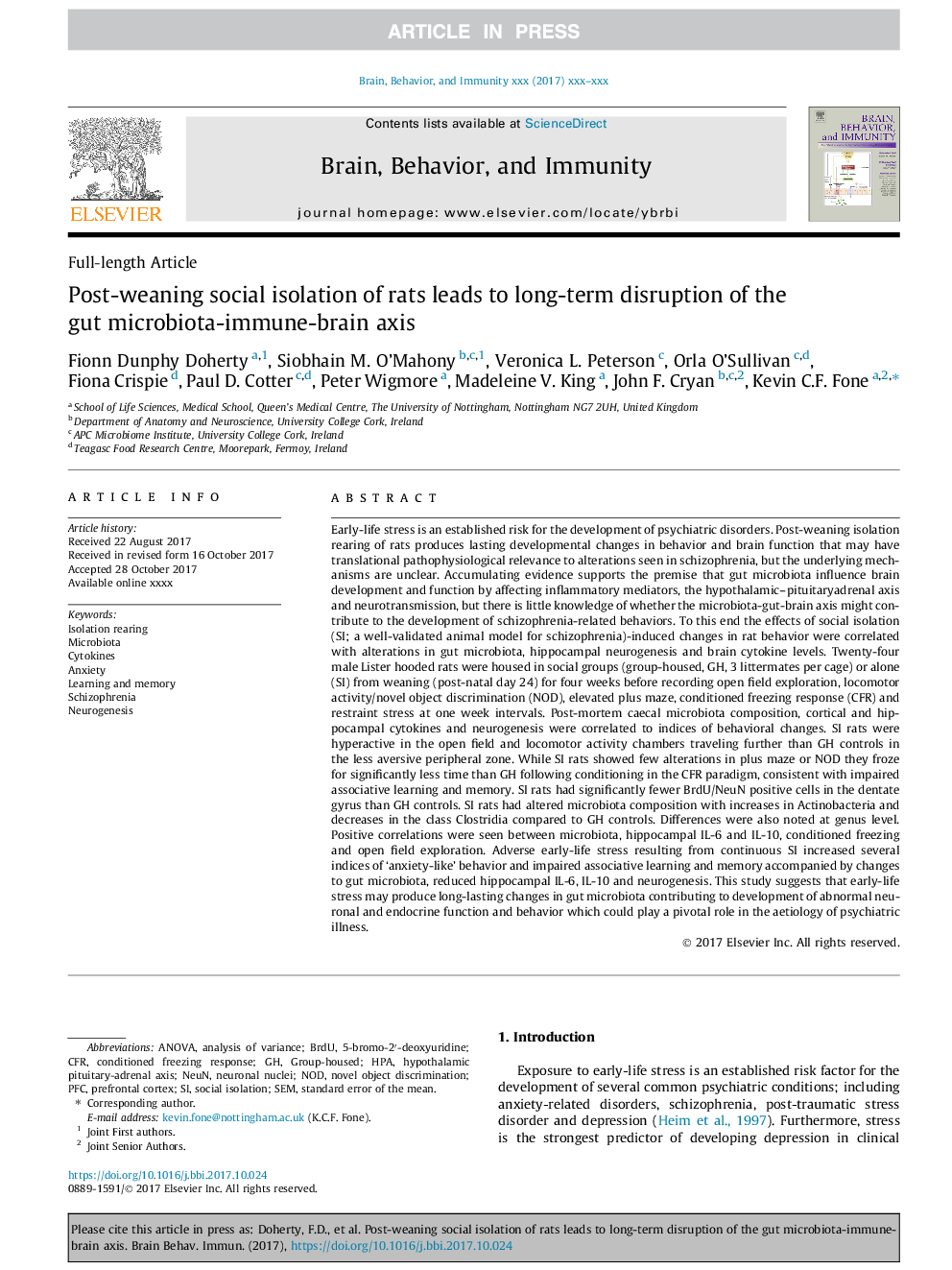| کد مقاله | کد نشریه | سال انتشار | مقاله انگلیسی | نسخه تمام متن |
|---|---|---|---|---|
| 7279665 | 1473898 | 2018 | 13 صفحه PDF | دانلود رایگان |
عنوان انگلیسی مقاله ISI
Post-weaning social isolation of rats leads to long-term disruption of the gut microbiota-immune-brain axis
ترجمه فارسی عنوان
انزوای اجتماعی پس از جدایی موشها منجر به اختلال طولانی مدت در محور میکروبیوتا-ایمن و مغز روده می شود
دانلود مقاله + سفارش ترجمه
دانلود مقاله ISI انگلیسی
رایگان برای ایرانیان
کلمات کلیدی
Group-housedNeuNNODPFCCFR5-bromo-2′-deoxyuridine - 5-bromo-2'-deoxyuridineSchizophrenia - اسکیزوفرنی یا شیزوفرنیAnxiety - اضطرابSocial isolation - انزوای اجتماعیBrdU - بروموداکسی اوریدینanalysis of variance - تحلیل واریانسANOVA - تحلیل واریانس Analysis of variancestandard error of the mean - خطای استاندارد میانگینCytokines - سیتوکین هاprefrontal cortex - قشر prefrontalSEM - مدل معادلات ساختاری / میکروسکوپ الکترونی روبشیHPA - میلی بار یا هکتوپاسکالMicrobiota - میکروبیوتاNeurogenesis - نوروژنزneuronal nuclei - هسته های نورونیIsolation rearing - پرورش جداسازیLearning and memory - یادگیری و حافظه
موضوعات مرتبط
علوم زیستی و بیوفناوری
ایمنی شناسی و میکروب شناسی
ایمونولوژی
چکیده انگلیسی
Early-life stress is an established risk for the development of psychiatric disorders. Post-weaning isolation rearing of rats produces lasting developmental changes in behavior and brain function that may have translational pathophysiological relevance to alterations seen in schizophrenia, but the underlying mechanisms are unclear. Accumulating evidence supports the premise that gut microbiota influence brain development and function by affecting inflammatory mediators, the hypothalamic-pituitaryadrenal axis and neurotransmission, but there is little knowledge of whether the microbiota-gut-brain axis might contribute to the development of schizophrenia-related behaviors. To this end the effects of social isolation (SI; a well-validated animal model for schizophrenia)-induced changes in rat behavior were correlated with alterations in gut microbiota, hippocampal neurogenesis and brain cytokine levels. Twenty-four male Lister hooded rats were housed in social groups (group-housed, GH, 3 littermates per cage) or alone (SI) from weaning (post-natal day 24) for four weeks before recording open field exploration, locomotor activity/novel object discrimination (NOD), elevated plus maze, conditioned freezing response (CFR) and restraint stress at one week intervals. Post-mortem caecal microbiota composition, cortical and hippocampal cytokines and neurogenesis were correlated to indices of behavioral changes. SI rats were hyperactive in the open field and locomotor activity chambers traveling further than GH controls in the less aversive peripheral zone. While SI rats showed few alterations in plus maze or NOD they froze for significantly less time than GH following conditioning in the CFR paradigm, consistent with impaired associative learning and memory. SI rats had significantly fewer BrdU/NeuN positive cells in the dentate gyrus than GH controls. SI rats had altered microbiota composition with increases in Actinobacteria and decreases in the class Clostridia compared to GH controls. Differences were also noted at genus level. Positive correlations were seen between microbiota, hippocampal IL-6 and IL-10, conditioned freezing and open field exploration. Adverse early-life stress resulting from continuous SI increased several indices of 'anxiety-like' behavior and impaired associative learning and memory accompanied by changes to gut microbiota, reduced hippocampal IL-6, IL-10 and neurogenesis. This study suggests that early-life stress may produce long-lasting changes in gut microbiota contributing to development of abnormal neuronal and endocrine function and behavior which could play a pivotal role in the aetiology of psychiatric illness.
ناشر
Database: Elsevier - ScienceDirect (ساینس دایرکت)
Journal: Brain, Behavior, and Immunity - Volume 68, February 2018, Pages 261-273
Journal: Brain, Behavior, and Immunity - Volume 68, February 2018, Pages 261-273
نویسندگان
Fionn Dunphy-Doherty, Siobhain M. O'Mahony, Veronica L. Peterson, Orla O'Sullivan, Fiona Crispie, Paul D. Cotter, Peter Wigmore, Madeleine V. King, John F. Cryan, Kevin C.F. Fone,
